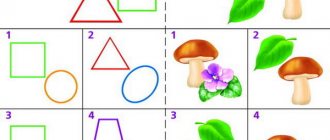In connection with the entry into force of new legislative acts (Federal Law No. 273 of December 29, 2012 “On Education in the Russian Federation” and the Federal State Educational Standard for Preschool Education), there is a need to revise and bring into compliance all documentation of a preschool institution, including the documentation of a preschool educational psychologist .
This article will discuss the work programs of an educational psychologist.
LEADING ACTIVITY – GAME
So, play plays a major role in the mental development of preschool children. Going through certain age stages, it transforms depending on the degree of development of the baby:
- 3 – 4 years – director’s play;
- 4 – 5 years – the game becomes figurative and role-playing;
- 5 – 6 years – the game takes on a role-playing orientation;
- 6 - 7 years old - preschoolers play according to the rules established for each game.
Each game, to one degree or another, reflects some area of activity, as well as relationships. The game gradually ceases to be manipulative - using only objects. Its essence is transferred to a person, to his activities. Therefore, the child perceives the actions of adults as not only an objective, but also a subjective example.
The game has enormous developmental and educational significance. During games, children learn to fully communicate with each other: share, negotiate, help, conflict. The game develops motivation and the needs of children. In role-playing games with complex plots and actions, preschoolers actively develop their creative imagination. The game helps the child improve voluntary memory, perception, thinking, and intellectual activity. All this contributes to its further development and becomes the basis for preparation for training.
How to help a child develop?
There is a concept called the “zone of proximal development.” It was introduced into psychology by the famous Soviet psychologist L.S. Vygotsky. The zone of actual development is the child’s skills that he performs independently, without the help of adults.
Also, in preschool age, a child actively develops many mental functions, and with the assistance of an adult, he can learn a lot. You just need to do it not FOR him, but TOGETHER with him. What a preschooler can do with the help of an adult, a little later he will be able to do on his own. This is called the zone of proximal development. If you want to teach your child something, do it with him first. In addition, this is how we develop his confidence in his abilities.
We are always in a hurry to get somewhere, and it seems easier and faster to do something for the child. But then we expect that he himself will be able to put away toys, cut out paper and put clothes in the closet.
Children are capital in which you need to invest time and attention, and they will pleasantly surprise you.
Speech development
At preschool age, the centers responsible for speech functions mature in the child’s psyche, and the process of mastering native speech is completed. The little man's vocabulary increases significantly. At six years old, a child’s active vocabulary contains 2500-3000 words. This is three times more than that of a three-year-old child.
However, these indicators depend entirely on the environment in which children grow up. Preschoolers have a large vocabulary if their parents talk to them a lot and read fairy tales and stories with them (this is how they become familiar with literary speech).
This period is characterized by the so-called word creation of children - the ability to form bizarre forms of words or use words in an unusual meaning.


